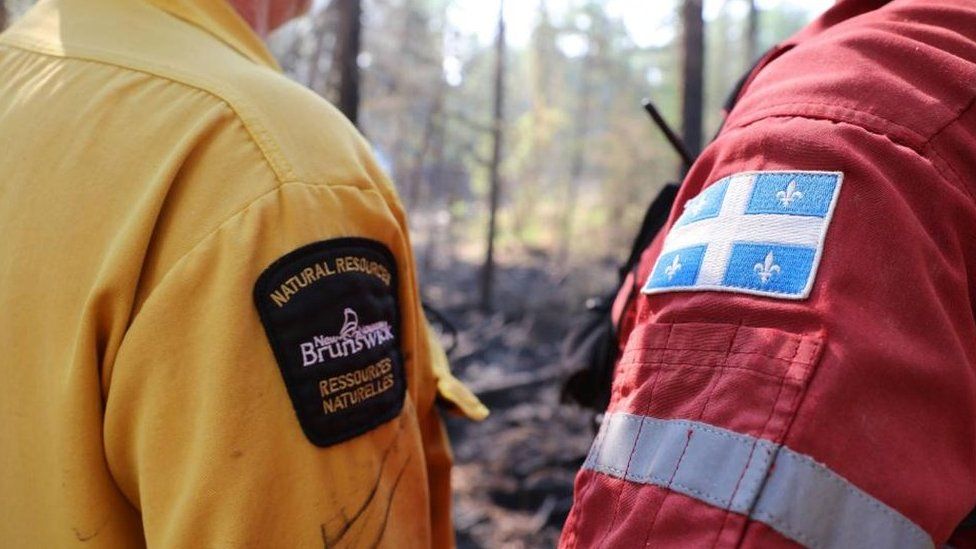Canada wildfires: Global help arrives as Quebec fights ‘historic’ fires
- Published

Canadian provinces typically share firefighting resources to meet the demands of wildfire season. In this photo from Alberta, New Brunswick firefighters are working side-by-side with firefighters from Quebec
The wildfires that have blanketed a large area of eastern North America with smoke seemingly spread overnight in early June in the Canadian province of Quebec, thanks to dry and hot weather and several strikes of lightning.
Wildfires began to spread quickly early this month, jumping from 36 to over 100 after a 1 June thunderstorm.
After a seemingly ordinary start to the fire season, "within three days, everything went very bad", said Philippe Bergeron with Quebec's firefighting agency.
The growing flames have drained local firefighting resources.
Global firefighters are arriving in Quebec to help put out the more than 130 forest fires currently burning in the region.
Around 110 firefighters from France were scheduled to arrive in Quebec on Thursday, and some additional help has already arrived from the nearby province of New Brunswick.
Mr Bergeron told the BBC that the additional help will make "a huge difference" for local firefighters struggling to contain the flames, many of whom are working 14-hour days that begin at sunrise.
Watch: Hazardous air quality filmed over New York lake
Without the extra hands, Mr Bergeron said Quebec's local firefighting capabilities would only be able to handle around 25 to 35 large forest fires at any given time.
The province typically has around 250 local firefighters that are ready to battle wildfires at any given year, Mr Bergeron said - a fraction of the 1,200 that Quebec Premier Francois Legault said is needed to successfully help fight the current fires.
To meet the unprecedented need, the province has trained 300 additional people in Quebec City over the last week so they can be deployed immediately.
Mr Bergeron said they have undergone three days of intense training and "most of them are people experienced in the forest, either forest workers or they have previous firefighting experience".
The US said it is also sending an additional 600 firefighters to Canada. Around 100 of them expected to arrive in Quebec next week, Mr Bergeron said.
'Within one day, there was fire everywhere'
As of Thursday, the number of fires in Quebec has decreased from 150 to 137. But a new challenge has emerged: some fires are getting so large, Mr Bergeron said, that they are now merging with other fires.
Quebec has never seen wildfires of this scale, which occur more typically in parts of western Canada, like Alberta and British Columbia. More than 280,000 hectares (691,900 acres) of land was burning as of Thursday in the eastern province.
The province's wildfire season reached a turning point after that 1 June thunderstorm.
"Within one day, there was fire everywhere," Mr Bergeron said.
Since then, nearly 15,000 people in central Quebec have been evacuated from their homes.
Around 5,000 others are being evacuated in total in Canada, as fires burn across the country in Alberta, British Columbia, Nova Scotia and the Northwest Territories as well.
Federal officials in Canada have warned that this may be the country's worst wildfire season on record. Nearly four million hectares (9.8 million acres) of land has burned so far in - around 12 times the 10-year average for this time of year.
The unusually active season has ignited some calls among politicians for the creation of a national fire service.
Canada typically relies on each province sharing resources or help from nearby US states.
- Published8 June 2023
- Published8 June 2023
- Published29 June 2023